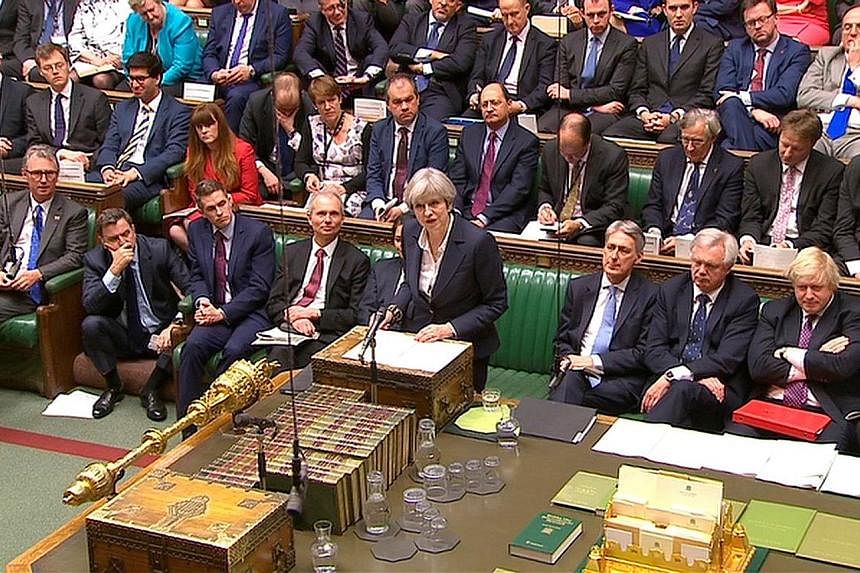Britain took a step into the unknown yesterday as Prime Minister Theresa May formally launched negotiations to exit the European Union in two years.
"The Article 50 process is now under way and in accordance with the wishes of the British people, the United Kingdom is leaving the European Union," she said in Parliament, minutes after the Brexit process was triggered in Brussels. "This is a historic moment from which there can be no turning back."
She also appealed for unity from Britons, many of whom voted against Brexit, against the backdrop of Scottish leaders seeking another referendum on whether to stay part of the United Kingdom.
"Now that the decision has been made to leave the EU, it is time to come together," said Mrs May.
Striking a conciliatory note ahead of the tortuous talks that lie ahead, Mrs May stressed Britain's shared values and common interests with Europe in her letter to EU President Donald Tusk.
"The task before us is momentous, but it should not be beyond us,'' she said of the goal of achieving a positive outcome from the Brexit talks. Some European leaders, however, warned of tough times ahead.
The process of separation began yesterday, as Sir Tim Barrow, the British Ambassador to the EU, handed Mr Tusk a formal letter invoking exit procedures contained in Article 50 of the EU's Lisbon treaty.
The letter, personally signed by the British Prime Minister - set out in broad strokes the principles she hopes will guide both sides as they negotiate "our future partnership alongside those of our withdrawal from the EU".
Britain will outline its strategy to break from more than four decades of EU regulations today.
The EU is also acting swiftly: The European Commission plans to issue its "draft negotiation guide- lines" by tomorrow. Nevertheless, these are merely the first skirmishes in what is guaranteed to be a gruelling battle.
Britain may be presented a hefty bill to settle its obligations. The future of its trading relations with the EU is also up in the air.
Mrs May reiterated that Britain was prepared to walk away from the EU with no Brexit deal if talks stalled. But she was hopeful of a future partnership, notably in the areas of security and free trade.
"We should continue to work together to advance and protect our shared European values... We want to play our part to ensure that Europe remains strong and prosperous and able to lead in the world," she said in the letter.
German Chancellor Angela Merkel said yesterday she hoped Britain and the EU would remain close partners.
But other EU leaders struck a grimmer note. French President Francois Hollande warned of pain ahead for Britain, while Mr Tusk told reporters that there was "no reason to pretend this is a happy day".
The markets were sanguine. Although the pound dipped yesterday against the dollar, European stock markets largely held steady, with investors having largely priced in Brexit in the nine months since the referendum last year.
Still, a rocky road awaits Mrs May. She will have to contend with not just EU negotiators driving a hard bargain, but also hardline Brexiteers demanding a clean break.
And time is short. In theory, there are two years to iron out differences, but the available time for deal-making is probably just one year, because no substantive talks will be carried out until the French and German elections are out of the way by the end of September, and another six months would be required for any deal which emerges to be ratified by Parliaments in 28 EU member-states, including the British one.
SEE TOP OF THE NEWS:
With Brexit triggered, it's crunch time for May











